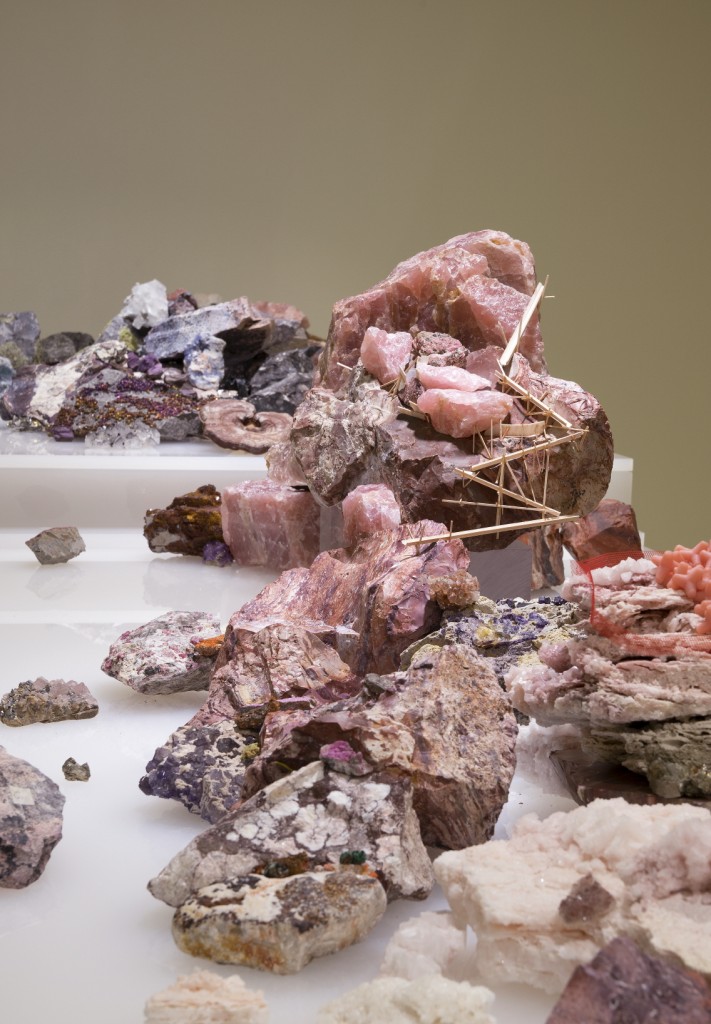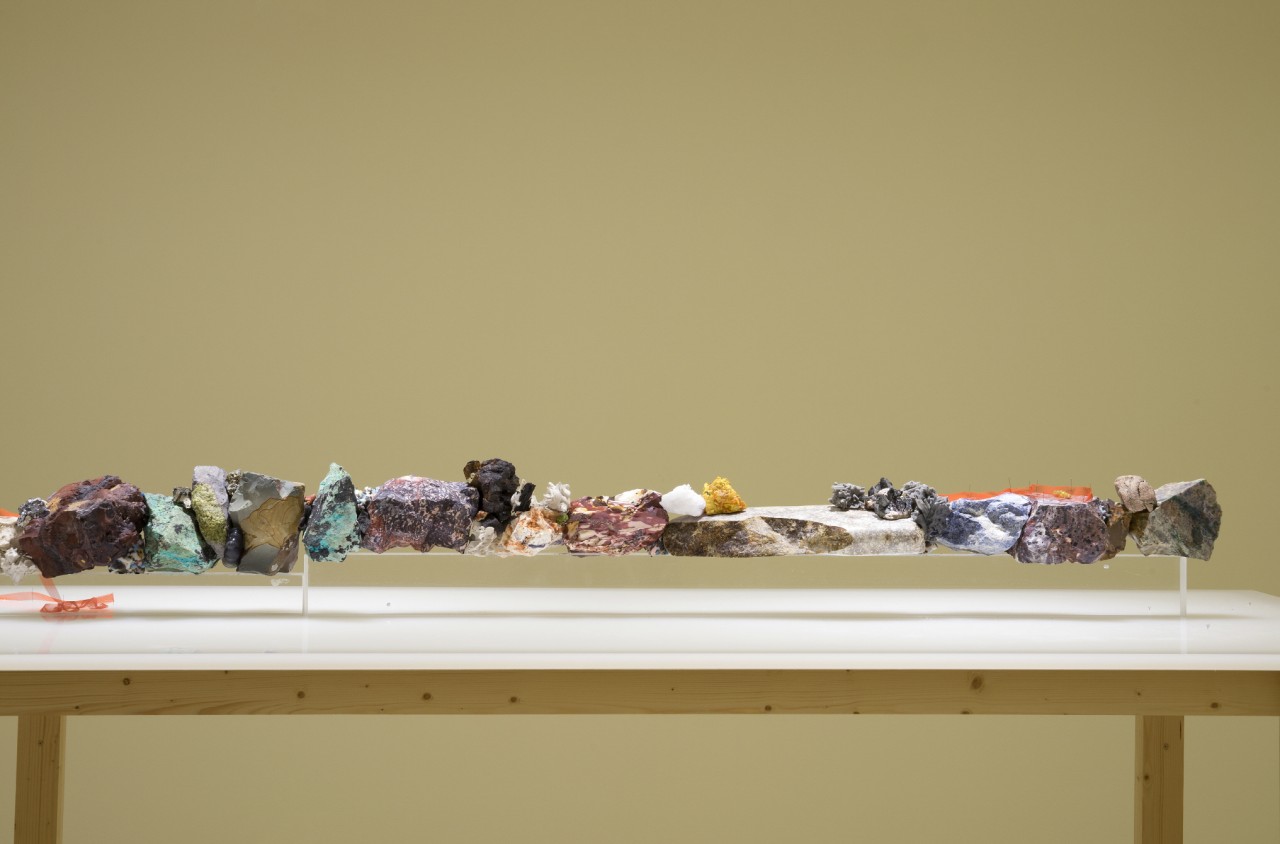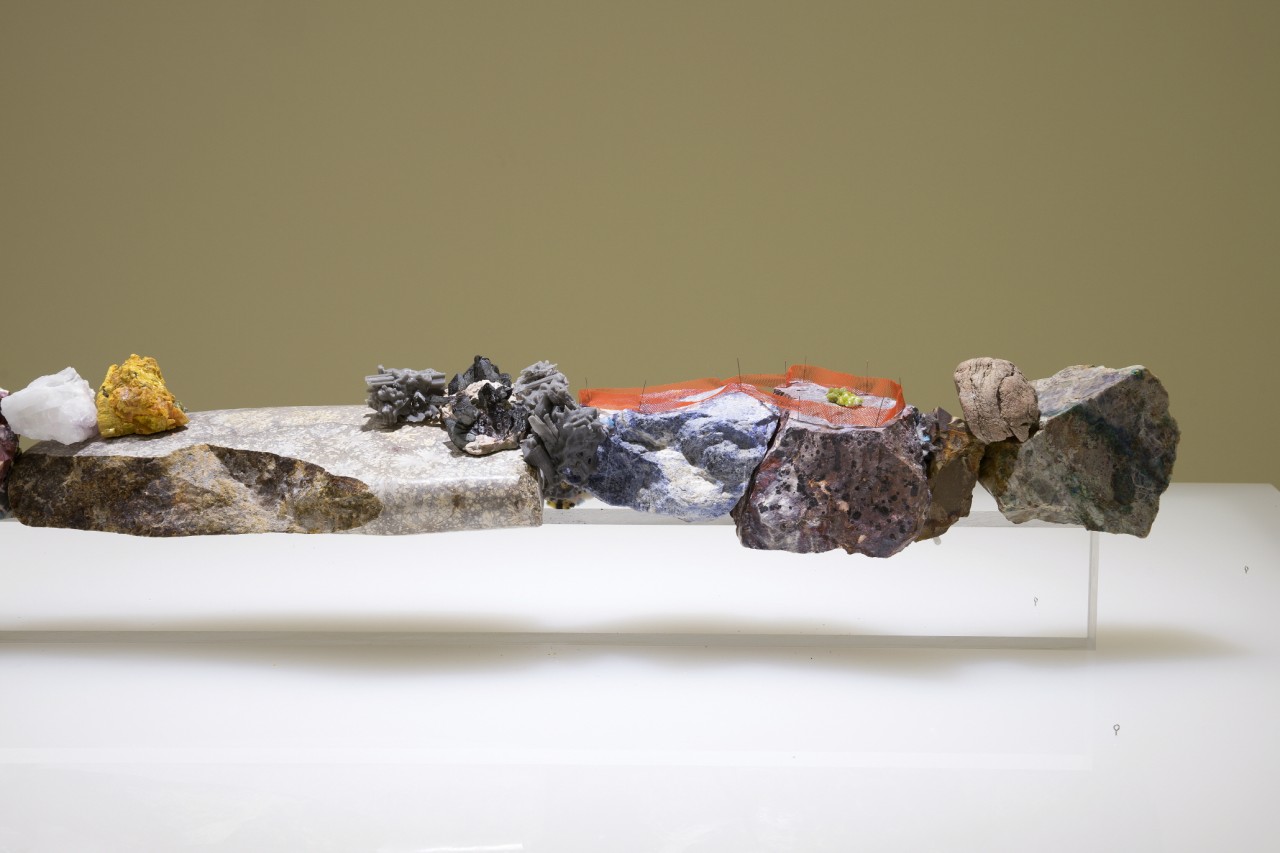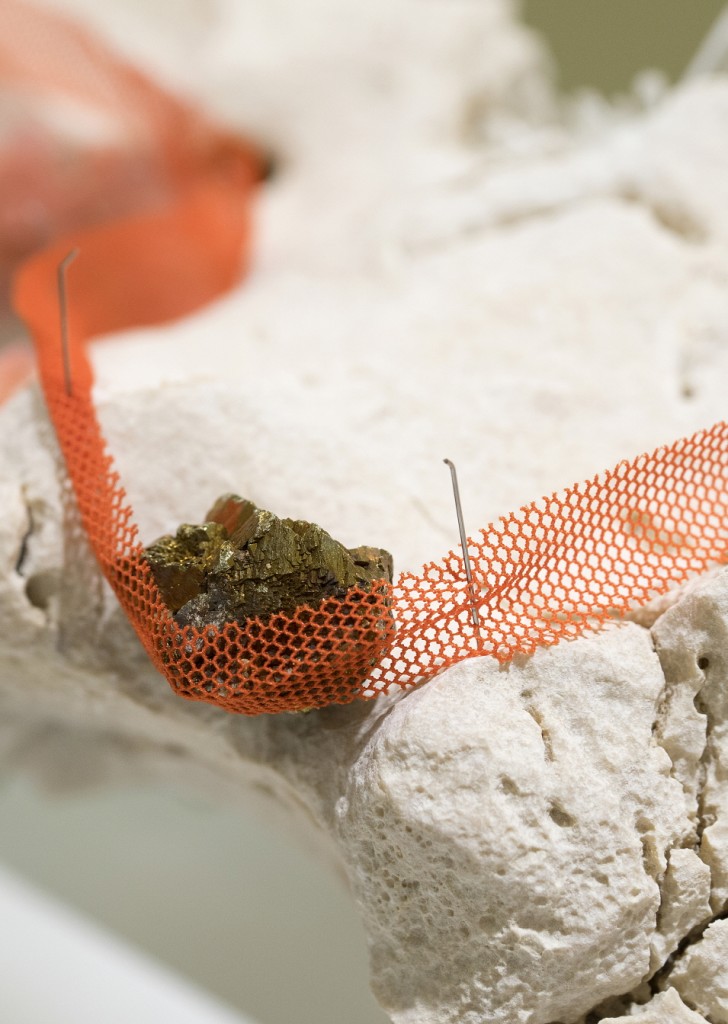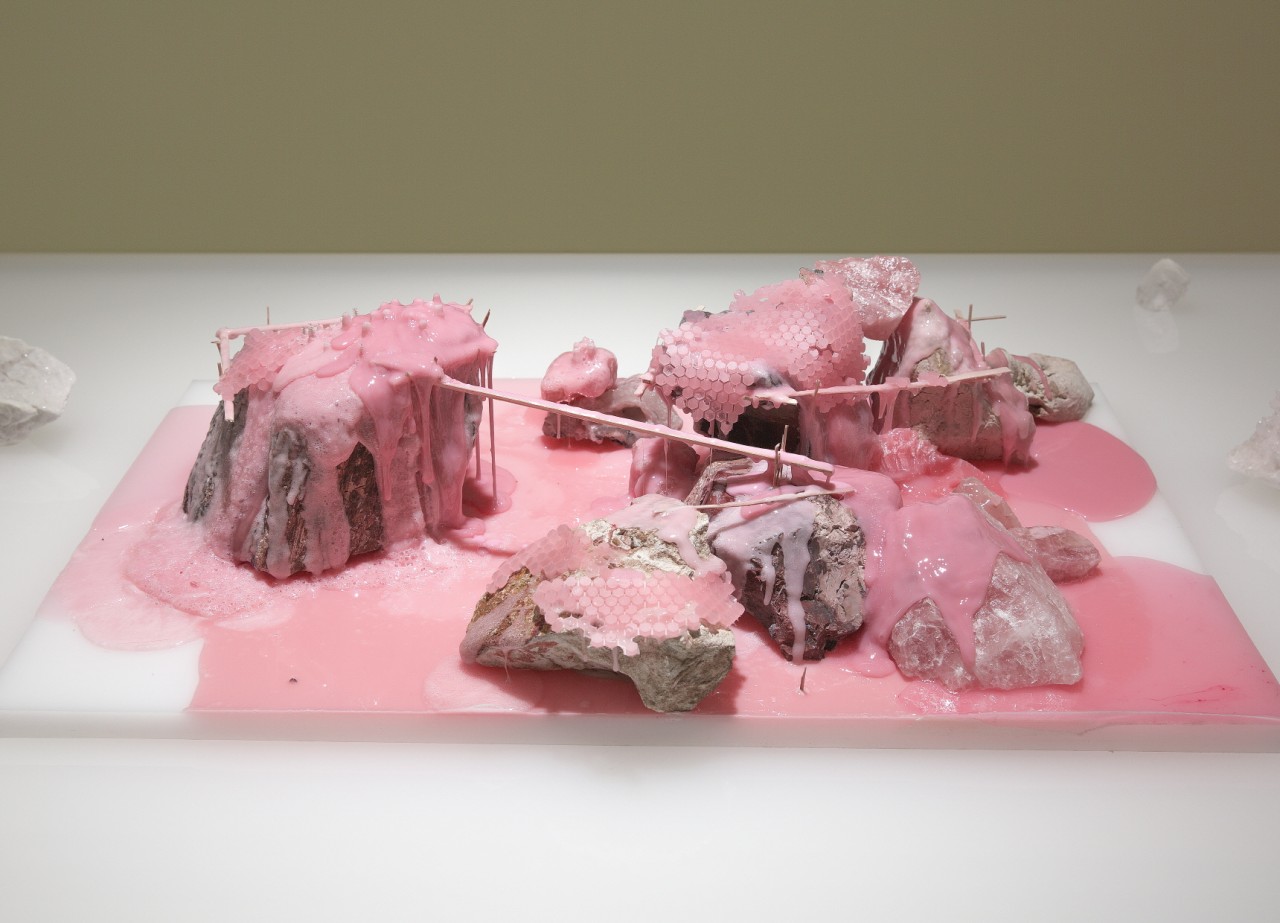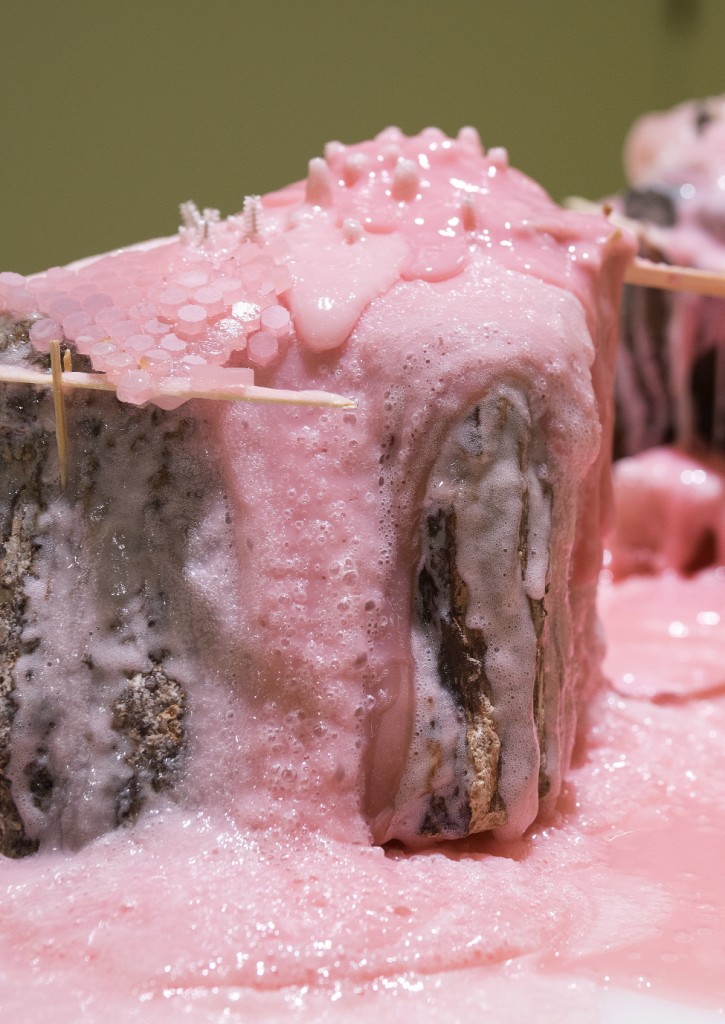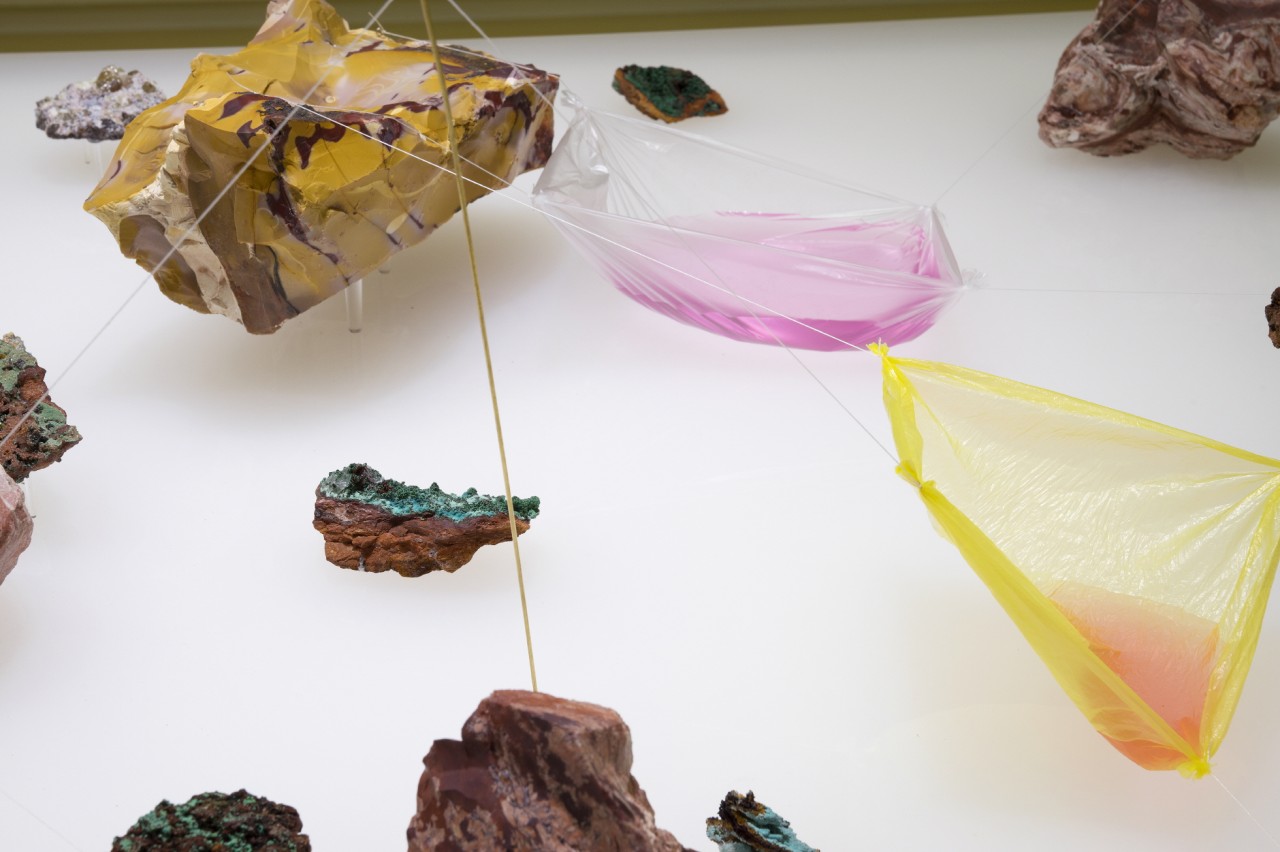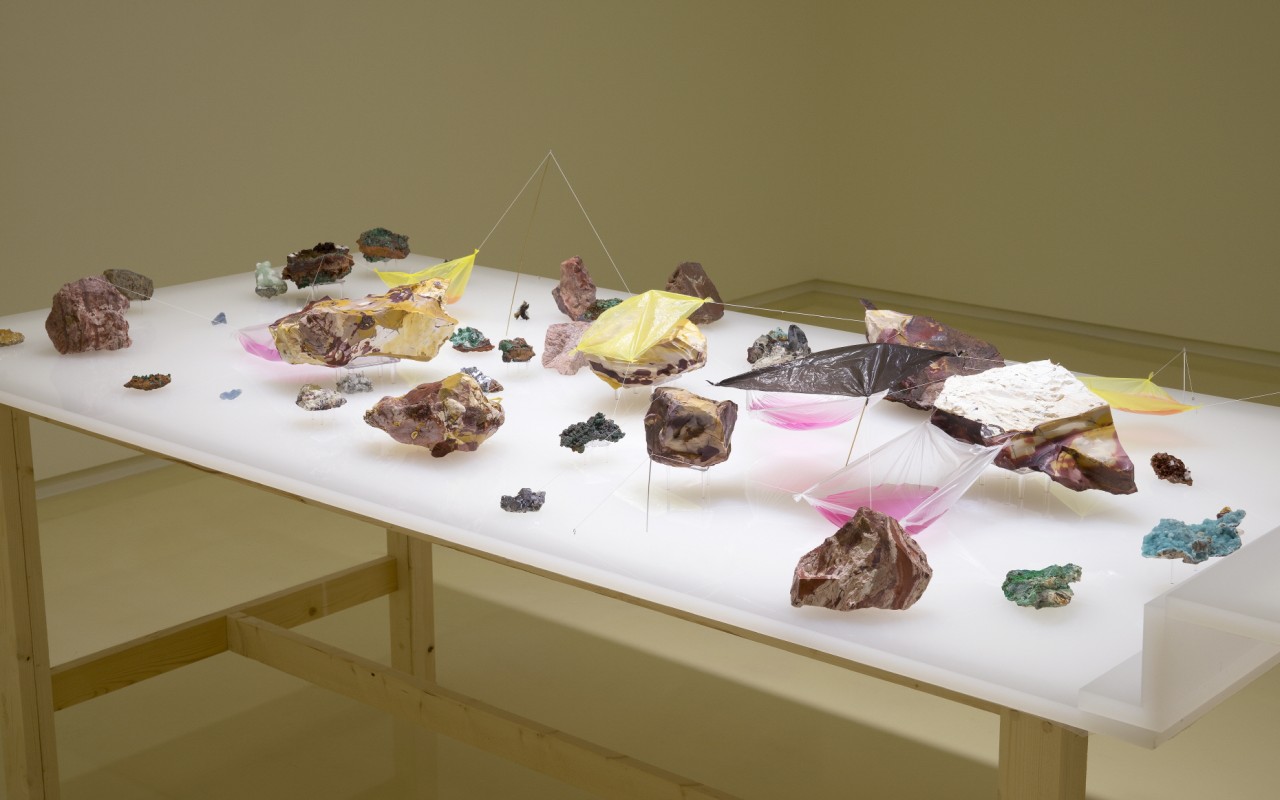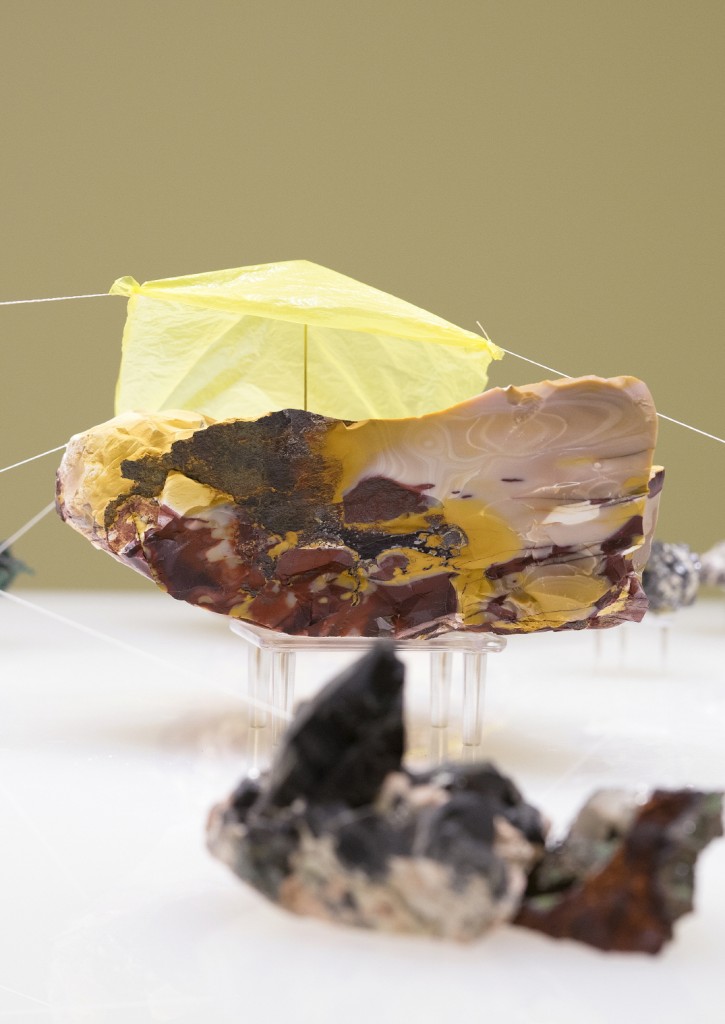Exhibitions
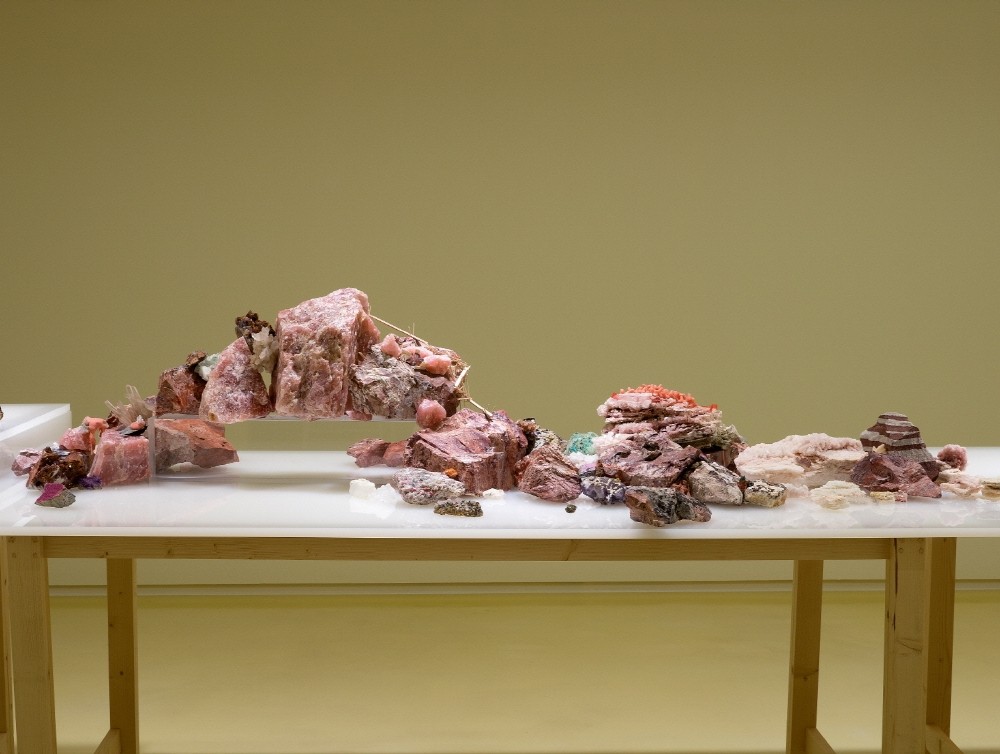
PERIGEE ARTIST #9 이동욱
모두 다 흥미로운
2016.06.09. THU ~
2016.08.06. SAT
표면(表面)과 이면(裏面) 사이
신승오(페리지갤러리 디렉터)
이동욱은 작은 인물들을 통해서 동시대를 살아가고 있는 인간이라는 존재에 대한 성찰을 보여주는 작업들을 선보여 왔다. 초기 작업에서는 제품이미지 속의 인물들이 실제로 그 용기 안에 들어 있는 독특한 방식으로 자본주의 사회에서의 인간의 모습을 풍자적으로 보여주었으며, 그 이후에는 화려한 외관을 가진 황금빛의 트로피, 밧줄, 칼, 도끼 등의 다양한 오브제를 사용하여 드라마틱한 배경에 인간을 배치하는 방식으로 냉소적인 시선의 작업을 진행하여 왔다.
이렇게 작은 인물들을 통해 함축적으로 우리들의 삶에 대하여 이야기해왔던 이동욱의 작업세계는 몇 가지 중요한 흐름을 가지고 있다. 초기에는 오브제와 등장하는 인물들을 통해 시각적인 즐거움과 상상력을 선보였다면, 그 이후의 작업들은 인체에 대한 관심으로 전이 되었고, 점점 더 의미들이 확장되어 생명체에 대한 이야기로 넘어오게 된다. 점차적으로 다양한 것들, 다시 말해 세상에 존재하는 모든 것들의 공존에 대하여 작업을 해오고 있다. 그가 작업에서 보여주는 방식은 크게 두 가지의 방식으로 살펴볼 수 있다. 하나는 인체 특히 인간의 피부에 대한 것이다. 피부는 말 그대로 연약한 인간의 표면이다. 선홍 빛의 피부는 아주 연약한 피막으로도 보이며 그가 만들어 내는 모든 인물에 나타난다. 또한 인물뿐만이 아니라 선홍 빛의 피부를 연상시키는 오브제 작업은 위태로운 균형, 조금이라도 ....
Between the Surface and the Hidden Side
By Shin Seung-oh, Director of Perigee Gallery
Dong Wook Lee has exhibited works that display his introspection on human existence in our age through figurines. In his early pieces, Lee satirically represented life in a capitalist society in a unique manner in which he portrayed figures in a receptacle. After that, he worked from a cynical perspective, portraying humans in a dramatic backdrop while using a variety of objects such as golden trophies, ropes, knives, and axes.
Lee’s art has been a connotative showcase of our lives through such figurines, classified into several tendencies. He presented visual pleasure and imagination trough objects and characters in works he did in the early stage of his career. Since then, he has showed interest in the human body and addressed narratives on life forms, gradually extending the domain of meaning in his art. He has worked on various things or the coexistence of all things. Two factors can be considered to analyze the trends of his work. One concerns the body or the skin. The skin is the tender surface of the human body. Th....
신승오(페리지갤러리 디렉터)
이동욱은 작은 인물들을 통해서 동시대를 살아가고 있는 인간이라는 존재에 대한 성찰을 보여주는 작업들을 선보여 왔다. 초기 작업에서는 제품이미지 속의 인물들이 실제로 그 용기 안에 들어 있는 독특한 방식으로 자본주의 사회에서의 인간의 모습을 풍자적으로 보여주었으며, 그 이후에는 화려한 외관을 가진 황금빛의 트로피, 밧줄, 칼, 도끼 등의 다양한 오브제를 사용하여 드라마틱한 배경에 인간을 배치하는 방식으로 냉소적인 시선의 작업을 진행하여 왔다.
이렇게 작은 인물들을 통해 함축적으로 우리들의 삶에 대하여 이야기해왔던 이동욱의 작업세계는 몇 가지 중요한 흐름을 가지고 있다. 초기에는 오브제와 등장하는 인물들을 통해 시각적인 즐거움과 상상력을 선보였다면, 그 이후의 작업들은 인체에 대한 관심으로 전이 되었고, 점점 더 의미들이 확장되어 생명체에 대한 이야기로 넘어오게 된다. 점차적으로 다양한 것들, 다시 말해 세상에 존재하는 모든 것들의 공존에 대하여 작업을 해오고 있다. 그가 작업에서 보여주는 방식은 크게 두 가지의 방식으로 살펴볼 수 있다. 하나는 인체 특히 인간의 피부에 대한 것이다. 피부는 말 그대로 연약한 인간의 표면이다. 선홍 빛의 피부는 아주 연약한 피막으로도 보이며 그가 만들어 내는 모든 인물에 나타난다. 또한 인물뿐만이 아니라 선홍 빛의 피부를 연상시키는 오브제 작업은 위태로운 균형, 조금이라도 힘이 가해지면 상처나 버리거나 훼손될 것 같은 연약함, 그 찰나의 긴장감으로 인해 극적인 분위기가 고조된다. 두 번째는 작은 인물이 등장하는 환경이다. 그가 사용하는 꿀과 벌집, 새장, 칼, 유명상품의 로고, 올가미 등은 이러한 환경들을 언캐니(uncanny)한 상황으로 만들기 위한 도구로서 사용된다. 또한 인물이 처한 상황은 우리가 일상적인 생활 속에서 만날 수 있는 도구들이나 공산품들을 사용함으로써 우리의 현실을 직설적으로 전달한다. 이렇게 만들어지는 극적인 상황 표현들은 작은 인물로 나타나는 그의 작업을 작지만 시각적으로 강렬하게 인식하게 만들어 왔다.
그렇다면 이번 전시에서는 어떤 작업을 선보이고 있는지 살펴보자. 이번 전시의 제목이자 작품의 제목은 <모두 다 흥미로운>이다. 그렇다면 작가는 무엇이 흥미롭다고 말하는 것인지 그 의미를 찾아낼 때 작품의 의도를 쉽게 파악할 수 있을 것이다. 우선 작품의 구성부터 훑어보자. 작가는 세계 각지에서 각기 다른 돌들을 주문하였다. 이 돌들은 서로 뒤엉켜 쌓여져 있으며, 이들 사이로는 이전의 작업들에서 사용되었던 재료와 오브제들이 등장하기도 한다. 다양한 형태와 색과 무늬를 가진 돌들은 하나 하나 개성이 있어 개별적으로 살펴보거나 작가가 설치한 전체의 형태를 살펴보는 두 가지의 시각적인 즐거움이 분명히 있다. 그러나 이러한 시각적 자극으로서의 흥미로움이 작가가 전달하고자 하는 것의 전부는 아닐 것이다. 이번 작업은 추상적이고 모호하여 다양한 해석이 가능하다. 예를 들면 세상을 구성하고 있는 하나하나의 주체성을 가진 모든 것들에 대한 이야기일 수 도 있고, 또 다른 관점에서 보면 자연과 인공물에 대한 이야기 같기도 하며, 불변의 것과 가변적인 것에 대한 이야기로도 읽힐 수 있다. 그렇다면 지금까지 작가가 선보여왔던 명확한 작업들과 이번 전시에서의 추상적이면서 모호한 작업은 어떻게 해석되어야 할까? 이런 다양한 해석이 가능하게 하는 설치 작업은 이전의 작업과 어떤 연계지점이 있는지를 파악하여야 전시주제이자 작품의 제목인 ‘흥미롭다’는 것에 대한 실체가 드러날 것이다.
우선 새롭게 사용된 소재와 오브제를 통해 그 단서를 살펴보도록 하자. 먼저 앞에서도 언급했던 돌은 우리가 살고 있는 지구의 표면을 이루고 있는 지구의 피부다. 그리고 생명체를 비롯하여 자연을 구성하는 것들만이 아니라 사람이 만들어낸 모든 것들은 피부를 가지고 있다. 따라서 우리는 삶이 지속하는 순간 언제나 피부와 피부를 맞대고 살아간다. 이렇게 돌은 우리에게 있어서 또 다른 의미의 피부로서의 상징으로 나타난다. 그렇다면 그가 이야기하는 피부는 무엇인가? 작가가 이야기하듯이 피부는 사람뿐만이 아니라 모든 자연과 사물, 세상 모든 것들은 자신의 독립된 신체를 구분 지을 수 있는 외부와 ‘나’ 사이의 경계로 작용한다. 따라서 우리는 세상의 모든 것을 접할 때 표면을 제일 먼저 접한다. 표면은 어떤 것들을 이해하고 구분하는 데에 가장 큰 척도가 되며, 이로 인해 여러 가지 갈등이 발생한다. 예를 들면 사람들의 피부는 그 다양함으로 인해서 동질감을 느끼기도 하지만 서로 배척하기도 한다. 이러한 표면이라는 보편적인 관념에 의해서 기준점이 나뉘어지고, 이런 어설픈 기준들에 의해서 각자가 가지고 있는 개별성은 쉽게 묻혀버리기 때문이다. 이렇게 우리를 둘러싸고 있는 이 피부라는 표면은 연약하지만 강력한 관념적 대상이다. 작가는 개성이 강한 다양한 돌들을 쌓아 나가면서 개별적인 주체성이 드러냄과 동시에 전체 풍경 속에 그 모습들이 가려져 버리는 상황을 만들어 낸다. 작가는 이렇게 모호한 설치 작업을 통해 모든 것은 표면뿐만이 아니라 그 이면을 바라보아야 하며, 이를 통해 개별적인 존재들을 인식하여야 한다고 말한다. 그리고 한편으로 전시 제목에 어떤 대상이 어떻게 왜 흥미로운지에 대해 명확하게 전달하지 않고 <모두 다 흥미로운>이라는 표현을 사용함으로써 이러한 개별적인 상태를 한 층 더 모호하게 만드는 태도를 보이고 있다.
이제는 돌들 사이에 등장하는 것들을 살펴보자. 돌들 사이에는 대부분 작가가 이전 작업에 사용했던 재료나 만들었던 오브제 들이 등장한다. 그 중에 주목해 볼 것은 버섯이다. 그의 근작들 중에는 버섯과 버섯의 형태를 가진 것들이 본체에 기생하여 등장하는 작업들이 있었다. 우리의 연약한 피부를 뚫고 솟아난 버섯은 또 다른 우리의 모습이면서도 또한 우리와는 전혀 다른 독자적인 것을 상징한다. 내부에서부터 외부로 이어진 이 버섯들은 양쪽에 다 속해있으면서도 그 어느 쪽과도 아무런 상관 없이 독자적인 성격을 가지는 표면과 이면을 이어주는 이중적인 성격을 가진 존재다. 그리고 결국에는 본체와 분리된다. 또한 이 버섯은 작가에 의해 가격표가 쌓여서 만들어지기도 한다. 우리는 어떤 물건의 숫자로 가치를 부여한다. 태초에는 존재하지 않은 가치를 우리는 임의대로 규정하며 이는 매우 유동적으로 증식한다. 시간이 지날수록 우리는 본체를 인식하는 것인지 숫자로 매겨진 가치를 인식하는지 경계가 불분명해진다. 따라서 그의 버섯은 본체에 뿌리를 두고 나온 것이 아닌 외부에서 표피에 붙여놓은 버섯이다. 이는 본체와는 상관 없이 표면에 존재하며 그 이면의 것들을 가려버린다.
그렇다면 새로운 요소들로 인해 이전 작업들과는 어떤 다른 변화가 생겨난 것일까? 이전 작업에서 이동욱이 보여주었던 인간은 인간으로서의 개성을 드러내는 개별적인 존재의 모습보다는 보편적인 한 사람의 인물로서 우리의 모습을 대변하였다. 따라서 지금까지 그의 작업에서는 대부분 군상의 모습이 아니라 단독상의 인물이 등장한다. 그로테스크한 누드는 선홍색 피부를 통해서 인간이라는 욕망에 가득 차 있어 불안하고 나약한 존재로 표현하는 데 있어서 효과적이었다. 이러한 방식은 전통적인 조각의 범주에서 인체를 탐구하거나 새로운 해석을 내놓기 보다는 그저 우리의 모습을 극적으로 전달하기 위한 수단일 뿐이었다. 그러나 이번 전시에서 선보이는 피부는 개인의 대한 이야기보다는 인류 더 나아가서 자연, 인공물 세상에 존재하는 모든 것에까지 확장되었다. 돌은 위에서 살펴보았듯이 다양하게 해석된다. 그가 돌들을 통해 이야기하는 것처럼 우리는 보편적으로 추구하는 가치가 있다고 믿지만 모두 똑 같은 생각을 가지고 있지 않다. 사람들은 조금씩 다른 생각들을 가지고 있으며 임시적인 합의를 이룬 것뿐이다. 따라서 전시의 타이틀이자 작품 제목에서 작가가 이야기하는 흥미롭다는 표현은 우리들이 가지고 있는 표면과 이면의 관계성을 통해 인간의 이중성과 그 보편 불가능성에 근거하고 있다. 모든 이론과 주장은 서로 양립할 수 없는 경우가 대부분이다. 우리는 이러한 다양한 것들의 조화를 위해 그 접점을 찾으려고 노력하며, 이로 인해 화해와 갈등을 반복한다. 그리고 이는 끊임없이 벌어지고 있는 임시적이면서도 가변적인 현실을 반영한다. 하지만 우리들의 노력에도 불구하고 이러한 갈등들은 표면과 이면이 공존할 수 없는 것으로 간주하게 만든다. 오히려 우리에게 있어서 다양성과 평등과 같은 보편적인 단어는 그 안에 더 많은 개별적인 존재들과 가치를 모호하게 만들어 오히려 본질에서 점점 더 멀어지게 만든다. 따라서 작가가 <모두 다 흥미로운>으로 명명한 것은 이러한 인간의 불완전한 인식에 대한 이야기를 담고 있는 것이다. 그리고 이를 표면과 이면의 관계를 통해 우리에게 전달하고자 한다.
지금까지 살펴 본대로 이동욱은 이번 전시에서 선보이는 작품들을 통해 지금까지의 작업요소들이 하나로 총 집합된 새로운 작품세계를 구축해 나가고 있다. 그러나 작가가 작품을 통해 이야기하듯이 이는 또 다른 커다란 이야기들 중 하나의 편린에 불과하다. 따라서 그의 작업은 임시적이고 유동적이다. <모두 다 흥미로운>이라는 작업에서 예전 작업에서부터 지금까지 작가가 사용해 왔던 다양한 요소들 속에는 이 세상 모든 존재들의 표면과 이면 사이에서 쉽게 발견할 수 없는 개별적 주체의 본질에 대한 인식 불가능한 상황들이 내재되어 있다. 이전까지 작가는 피부라는 표면을 통해서 이야기를 진행에 왔지만, 지금 그가 선보이는 작업의 표면은 단순한 인간의 피부가 아니라 우리가 인식하는 표면과 이면의 사이를 바라보고 있다. 표면의 반대말인 이면은 시각과 관점의 차이에 의해 구분되며, 사실은 이면과 표면은 다른 것이 아니다. 이렇게 이동욱의 작업표면과 이면 사이에 존재하는 우리들의 이야기를 발견할 수 있다. 우리는 시시각각으로 표면과 이면을 바꾸어가며 유동적으로 살아간다. 따라서 특정 단어나 표현 그리고 이념으로 고정되기 보다는 유연하게 사고하여야 한다. 그의 작업도 우리가 보는 관점에 따라 언제나 표면과 이면이 존재한다. 그렇기에 그의 작업에서 우리가 보아야 할 것은 거시적인 관점으로의 표면과 이면 그리고 그 사이에 존재하는 다양한 개별적 주체들을 미시적인 관점으로 발견해야 한다. 이런 시선으로 그의 작업을 바라보면 돌들과 그 사이의 오브제들은 단단하게 고정되어 있어 보이지만 부드럽고 가변적이다. 그리고 이는 자연스럽게 이전의 그가 선보인 작업들과 다르면서도 같고 같으면서도 다른 한 몸으로 나타난다. 이동욱은 이렇게 그만의 방식으로 우리들에게 표면과 이면에 대한 이야기로 보편적인 균형과 다양성의 공존이라는 서로 상충되는 것들을 해결하는 것이 정말 이룰 수 없는 이상적인 바람인지 사유할 수 있는 화두를 던지고 있다.
By Shin Seung-oh, Director of Perigee Gallery
Dong Wook Lee has exhibited works that display his introspection on human existence in our age through figurines. In his early pieces, Lee satirically represented life in a capitalist society in a unique manner in which he portrayed figures in a receptacle. After that, he worked from a cynical perspective, portraying humans in a dramatic backdrop while using a variety of objects such as golden trophies, ropes, knives, and axes.
Lee’s art has been a connotative showcase of our lives through such figurines, classified into several tendencies. He presented visual pleasure and imagination trough objects and characters in works he did in the early stage of his career. Since then, he has showed interest in the human body and addressed narratives on life forms, gradually extending the domain of meaning in his art. He has worked on various things or the coexistence of all things. Two factors can be considered to analyze the trends of his work. One concerns the body or the skin. The skin is the tender surface of the human body. The skin in scarlet seems like a very delicate membrane, adopted in all figures he has created. His object work also reminiscent of scarlet skin arouses some dramatic ambience with a precarious equilibrium, tenderness, and tension of the moment. The other is associated with the environment his figurines inhabit. Objects such as honey and hive, birdcages, name brand logos, and traps are used as devices to make such environments uncanny. He also bluntly depicts the realities we face with quotidian tools and industrial products we find in our everyday life. His work adopting figurines and tiny objects grows visually potent with his expression of such dramatic situations.
Let’s review works on show at this exhibition. The title of both this exhibition and his work is All the interestings. We can grasp what he intends with his work if we discover what he considers interesting. He first of all ordered stones of great diversity from all over the world. These stones are tangled up together and materials and objects used for his previous work appear among them. These stones with multifarious forms, colors, and patterns have their own distinctive individuality so they offer two types of visual pleasure: examining each stone and the overall forms he creates. This visual stimulus and interest is perhaps not all he wants to convey. This work is abstract and ambiguous so open to diverse interpretations. It can be about anything, natural or artificial objects in a sense, or all variable and invariable things. If so, how should his previous explicit works and abstract, ambiguous works at this exhibition be interpreted? The true nature of something “interesting” in the exhibit title cannot be revealed unless we grasp the connection between this installation open to multifarious interpretations and his previous work.
Let’s try to discover clues to interpreting his work through the new subject matter and objects he has adopted. The stones mentioned above are part of the earth, shaping its surface. Things humans have made as well as components of nature including life forms have their own skin. Thus, we live in contact with others’ skin as long as life goes on. If so, what’s the skin he talks about? As he denotes, the skin works as a border between one and the external world including humans, nature, things, and all in the world. When we contact all in the world, what we first contact is their surface. The surface is the most significant measure in figuring out and distinguishing things, which is also the source of conflicts. People’s skin varies in its color. The variety of human skin colors causes either identity or exclusion. This universal concept of the surface is a criterion, and each individuality is buried by this clumsy criterion. This skin is tender but represents a potent concept. Lee creates a situation in which individual subjectivity is revealed and concealed by its entire scene at the same time. He suggests that we have to see not only the surface but also the hidden side and perceive each individual being through such vague installation. He makes individual situations more ambiguous using the title All the interestings without expressing why some object is interesting.
Now, let’s examine things that appear among his stones. These are mostly materials he used in his previous works and objects he made. Noteworthy among them are mushrooms. In some of his latest works, mushrooms and mushroom-shaped things are parasitic on the main bodies. Mushrooms springing from a tender skin stand for our appearances and also freestanding things completely different from us. These mushrooms have a duplicity that links the surface to the hidden side: they belong to both but have an independent trait unrelated to both. They are after all detached from the main bodies. These mushrooms are made with an accumulation of price tags. We attach value to some product with numbers. We arbitrarily define the value that was inexistent in the beginning and it proliferates very fluidly. As time slips by, we cannot be sure whether we perceive the main body or the value priced with numbers. Thus, his mushrooms are not rooted in the main bodies but derive from the surface. They exist on the surface, concealing things of the hidden side.
What change occurs with the introduction of new factors in comparison with his previous work? Humans showcased in his previous work were not freestanding with their own personalities but universal figures representing our appearance. A lone individual, not a group of people, has been adopted for most of his works. The scarlet skin in seemingly grotesque nudes was effective in portraying humans as insecure, feeble beings fraught with desires. This manner is not to explore the body in terms of conventional sculpture or to present any new interpretation but is a means to portray us dramatically. The concept of skin in this exhibition has expanded to the realms of everything in the world including mankind, nature, and artificial things. As reviewed above, stone is translated diversely. As he speaks to us through stone, we believe there are universal values we pursue but not all think the same. We all have different ideas and are merely in a temporary agreement. The expression, “interesting” employed for the titles of this exhibition and work is predicated upon humanity’s duplicity and the impossibility of the universal as seen in the relation between the surface and the hidden side. Theories and assertions are mostly incompatible. We seek an agreement among these various factors for harmony, repeating conciliation, and conflict. And, this reflects a tentative, variable reality. Despite our efforts, the surface and the hidden side cannot coexist due to such conflict. To us, universal words such as diversity and equality take us away from the nature of humans by blurring each individual and value. As he mentions, “all the interestings” addresses incomplete human perception, trying to convey this to us through the relation between the surface and the hidden side.
As reviewed above, Lee has built his own world where all of his distinctive idioms are collected through works on show at this exhibition. As he mentions through his work, this is nothing but a shard of his whole world. Some unperceivable situations that are not easily discovered between the surface and the hidden side of all things in the world are inherent in diverse factors he has employed since his previous pieces. His work is either provisional or fluid. He previously told his stories through the surface of skins whereas the surfaces of his pieces on show now are not merely human skin but are somewhere between the surface and hidden side. The hidden side, an antonym of the surface, is distinguished by the difference of viewpoints and the two are not different. Our stories are discovered in between his work’s surface and hidden side. We are floating at times on the surface or at times in the hidden side. Therefore, we have to be flexible in our thinking rather than being stuck by any specific word, expression, or idea. Lee’s work has its surface and hidden side in a sense. What we have to discover in his work is the surface and hidden side from a macroscopic perspective and diverse individual subjects between them from a microscopic perspective. If we consider his work from this point of view, stones and objects among the stones seem tightly fixed but tender and variable. They naturally appear the same with and different from his previous work. He raises a discourse on whether it is really our ideal to conciliate conflicting elements through the pursuit of universal equilibrium and diversity in his own fashion, carrying his own story on the surface and hidden side.



